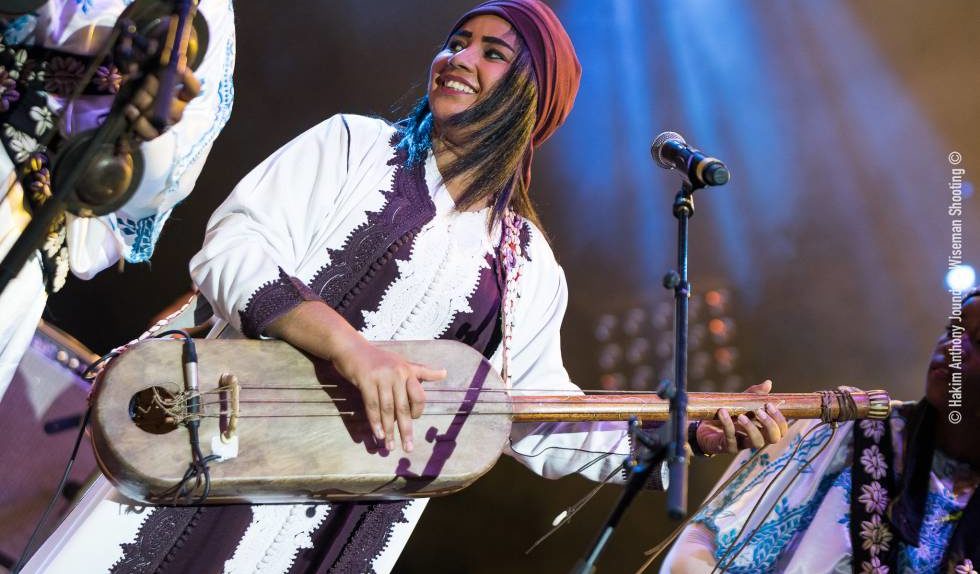It is always an accomplishment to be the first one to do something. Usually this requires a lot of character, courage, and creativity.
Asmâa Hamzaoui embodies these traits. She is the first and only woman Gnawa master in the world. She also leads the only all women’s Gnawa group in existence.
I discovered her on instagram and was immediately captivated by this video:
Gnawa (also spelled Gnaoua) music is indigenous to Morocco. It is the product of West African rhythms meeting with the Ancient Sufi Islamic Empire. Performances consist of Islamic ritual poetry mixed with traditional music and dance.
Religious performances can last for hours. A Gnawa ceremony is guided by a master called a maálem, who is usually playing a string instrument called a guembri (also spelled gimbri). The maálem also leads the vocalizations of poetry through call-and-response style singing. The music that accompanies the poetry is led by the hypnotic and rhythmic bass tones of the guembri. The rhythm is enforced by musicians clapping together iron castanets called krakens. Often the rhythms will start slower and then gradually speed up as more poems are sung. This is a common theme in the religious music of West Africa.
This tradition has been gaining more exposure in the U.S. and Europe lately because of groups like Innov Gnawa (led by Maâlem Hamid El Kasri) that have collaborated with bands like Snarky Puppy and Bonobo. These groups and collaborations are fantastic and definitely worth checking out. It is important to note however, that all of the collaborating musicians are men (in the Gnawa group and the American bands)
Hamzaoui was taught the Gnawa tradition by her father, who is also a Gnawa master (the renowned Maâlem Rachid Hamzaoui). In her words, her father thought he was going to have a son to teach music to. When he had a daughter, he decided to teach her instead. It is because of her father that Asmaâ had access to such expertise and training.
At the age of 20 (in 2012), Hamzaoui formed the group Bnat Tomboctou (Daughters of Timbuktu). The first all women’s Gnawa group. Musically they have stuck to tradition, but have felt free to introduce new themes to their music, including topics such as separation, suffering, and African culture and life. Their songs are performed in a more secular context and are shorter than traditional performances (so that they can be easily recorded and digested by those of us who are new to Gnawa).
Hamzaoui is a fantastic vocalist and truly a guembri master. There are very few female guembri players, and no one besides Hamzaoui has ever dared to step into the public spotlight. Hamzaoui is unique in that, despite some pushback from reactionaries, she is generally accepted as being an exception to the rule that only men can be Gnawa masters. This is remarkable because it is still very much considered taboo for women to play the guembri on stage in Morocco.
Obviously though, women are capable of doing whatever they want and excelling at it. Hamzaoui is actively sharing a more inclusive Gnawa tradition across the world and has the potential to inspire a new generation of Gnawa musicians who are not confined by gender roles.
In 2008 Bnat Tombouctou toured Europe for the first time. Dressed in t-shirts and jeans and fashionable sunglasses, it is powerful to witness these women expertly representing a culture and musical practice that did not used to be so receptive of their voices. Enjoy this wonderful street performance in Brussels to see for yourself.
One of my goals in the near future is to improve my French so I can travel back to Morocco and learn more about this wonderful and deep tradition.
How does this music make you feel? Who are you inspired by this week? I would love to hear your thoughts.
Keep an eye open for Hamzaoui’s upcoming debut album Oulad Lghaba!
